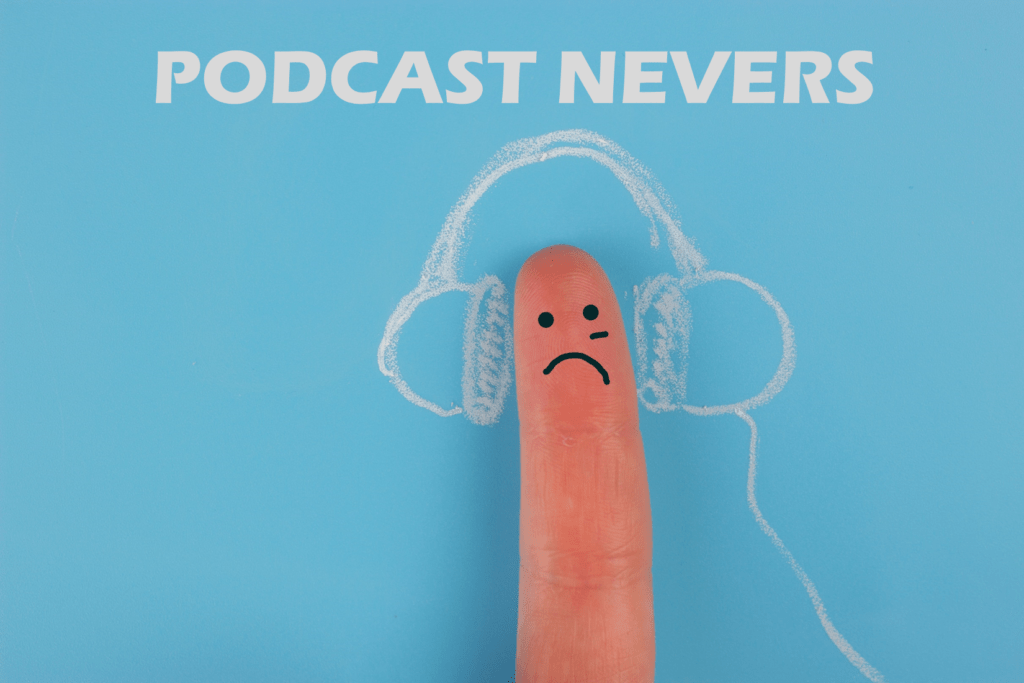
Podcasting’s exploding, right?
The #1 movie in the world is “Halloween” – a sequel set 40 years after the original release, directed by the iconic John Carpenter way back in 1978. So, what’s the premise for re-investigating the Michael Myers mystery? A documentary? A “60 Minutes” exposé? A newspaper investigative story?
No, a true crime podcast.
In 2018, podcasting is buzzworthy. Everywhere you turn, new celebrity and branded podcasts are being launched, podcasters are making 7-figure incomes, and radio companies are going “all in” to the space.
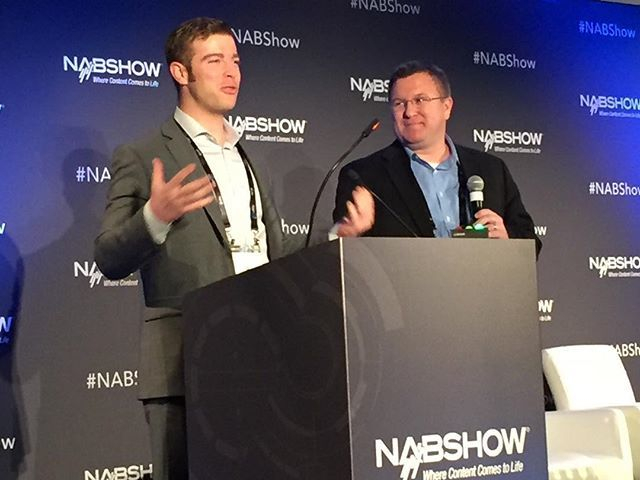
As we’ve discussed on this blog and with many of our clients as we help them navigate the turbulent media waters, an audio renaissance bodes well for the best-known, most listened to audio medium – radio.
And that’s why so many radio executives have read the tea leaves, run the numbers, and concluded they need a podcasting strategy. For the last three years, we’ve taken a lead role with Podcast Movement – the biggest and best attended gathering of them all. A big part of the reason for its success is the sheer, unadulterated energy and belief of its visionary creators, Dan Franks and Jared Easley.
And their success should be an indication to podcasting neophytes that dedication, commitment, and passion are key ingredients – whether you’re producing a podcast or you’re building a platform.
 We’re believers. And we will be back at Podcast Movement in Orlando next summer with our “Broadcasters Meet Podcasters” track. We’ve been encouraged that so many radio broadcasters were in attendance in Philly this year.
We’re believers. And we will be back at Podcast Movement in Orlando next summer with our “Broadcasters Meet Podcasters” track. We’ve been encouraged that so many radio broadcasters were in attendance in Philly this year.
And it’s been fascinating to watch some of the biggest companies commit to this space, from Entercom’s stake in Cadence 13 or iHeart’s recent $55 million purchase of HowStuffWorks. Interestingly, iHeart is using the slogan, “Podcasters Meet Broadcasters.” Aside from their dyslexia, it’s yet one more sign that podcasting has entered the mainstream.
Or has it?
By any measure, podcasting is growing with each passing year. I hear about it anecdotally in focus groups, many of my clients are talking about and launching podcasts, and we see it statistically in research studies conducted by a wide range of companies.
And yet, a look at the radio audiences in our major research initiatives – commercial radio’s TS 2018, Christian radio’s CMB 2018 and public radio’s PRTS 2018 – still shows a sizable number of “podcast nevers” – consumers who say they just don’t listen to podcasts. All this, despite “Serial,” Joe Rogan, “Pod Save America,” and the other podcasts making waves. Check out the red slices of the podcasting pie charts – the “podcast nevers” – in all three of our studies:
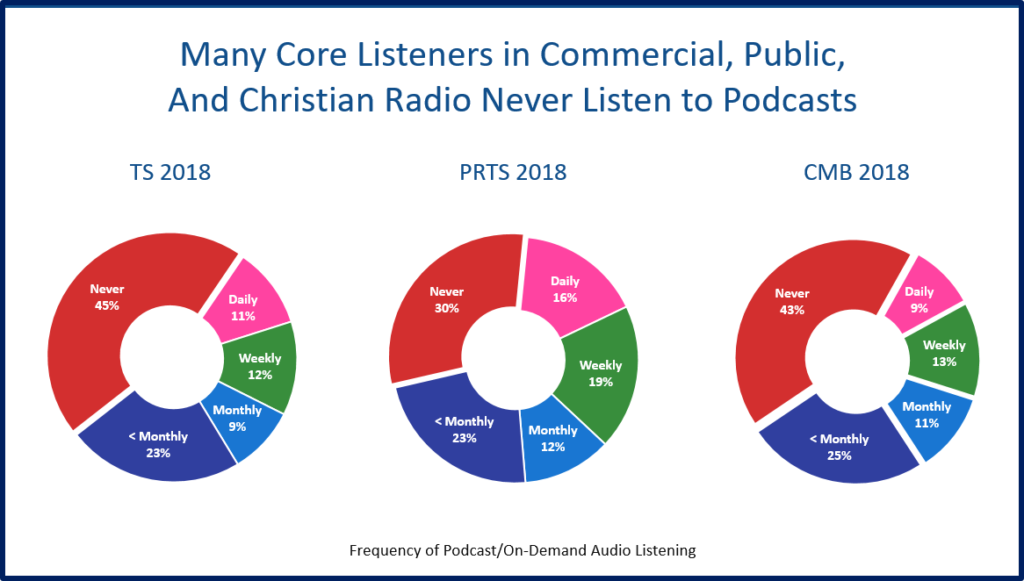
More than four in ten respondents in both our commercial and Christian radio surveys say they never listen to podcasts. And even in public radio – where podcast listening is a popular pastime – three in ten still say on-demand audio is not on their consumption menus.
The number one reason in all three studies is a stated lack of interest in podcasting. But logic suggests that because podcasts can be about anything, that response is more reflective of a lack of familiarity with the platform. And then there are the other issues facing podcasting – discovery, that lack of a native app on Android devices, or an overall lack of understanding about the space and how it works.
Podcasting experts have offered myriad reasons why podcasting – on-demand audio – has lagged behind its video counterpart: streaming video.
First, on-demand movies and TV have been popularized by a singular brand that got it right – Netflix. Discovering and watching a movie or TV show on the platform is almost as easy as just grabbing a beer. Making streaming video as seamless as say, listening to the radio, is a key to the growth of Netflix, and in its wake, Hulu and Amazon Prime.
Podcasting, on the other hand, is a kludgier experience, without the benefit of a familiar brand that instills a sense of confidence or loyalty. There is no big name in podcasting – it’s an industry made up of disparate tribes – Apple, NPR, Stitcher, Podcast One, Gimlet, and so many others. There isn’t just a couple of places to get podcasts – it’s more like a bazaar where you have to know your way around.
And then there’s the monetization issue. With Netflix and its competitors, the business model is familiar, convenient, and very serviceable – you pay a monthly, modest subscription fee for an all-you-can-eat service. Amazon is only slightly different because of its Prime membership. But the dynamic is the same.
Podcasting is going down the same road as broadcast radio – an ad-supported medium. It doesn’t matter whether they’re prerolls or midrolls, live reads or produced – they’re commercials. And just like on the radio, people skip them – as often as they can. We asked that question in this year’s Techsurvey among weekly podcast listeners, and we discovered this unsurprising finding: Consumers are repelled by commercials, no matter where they are or who reads them:
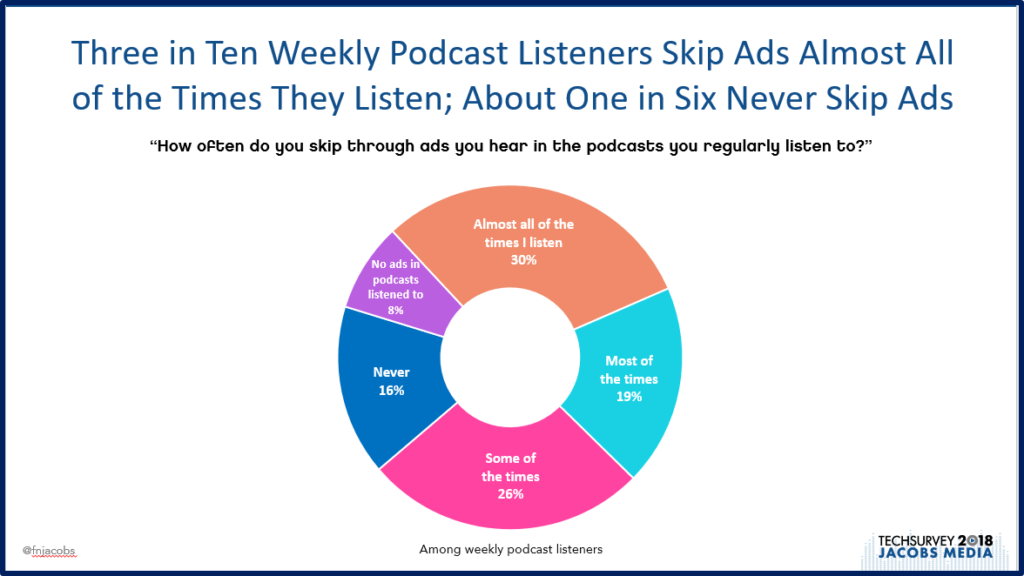
Between those who never listened to embedded podcast ads or tell us they skip ads all or most of the time, we’re looking at a majority of regular podcast listeners avoiding commercials.
And yet, paying for content has gone very mainstream. That’s the model used by new media brands as diverse as SiriusXM, Spotify, Netflix, and of course, the New York Times and the Washington Post, where millions pay money each and every month to avoid commercials, testimonials, and carnival barker ads. Yet, the podcasting community (except for Audible) has eschewed the subscription model in favor of the same lame broadcasting model consumers are gravitating away from.
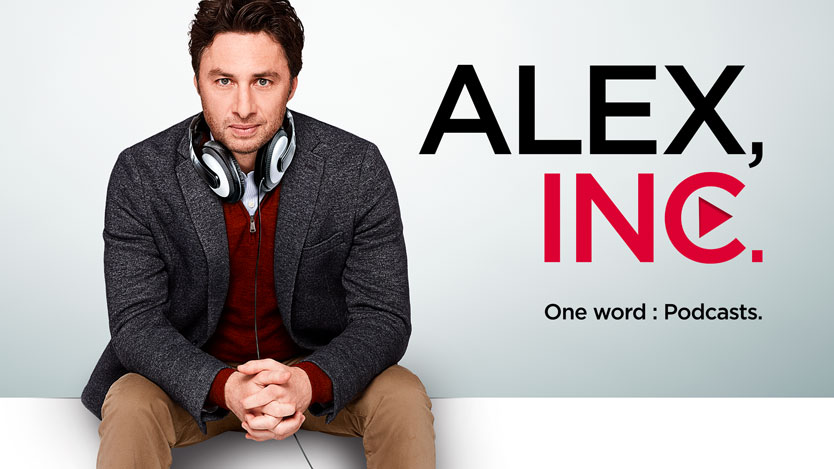 There’s no doubt podcasting is becoming more mainstream – at least in the media. Last fall, ABC-TV introduced a short-lived sitcom, “Alex, Inc.” starring Zach Braff. It was based on the episodic journey of podcaster Alex Blumberg who made his reputation with “This American Life” before going out on his own. But the TV show lasted just a few short and painful episodes before flaming out and facing the network cancellation guillotine.
There’s no doubt podcasting is becoming more mainstream – at least in the media. Last fall, ABC-TV introduced a short-lived sitcom, “Alex, Inc.” starring Zach Braff. It was based on the episodic journey of podcaster Alex Blumberg who made his reputation with “This American Life” before going out on his own. But the TV show lasted just a few short and painful episodes before flaming out and facing the network cancellation guillotine.
And then there’s the new “Halloween” movie mentioned at the top of this post, featuring two annoying British podcasters – Aaron Corey and Dana Haines – as a plot mechanism for dredging up the serial killing mystery focused on a killer who never talks. (That makes for a tough interview for any podcast.)
The Ringer’s Miles Surrey offers up a somewhat sarcastic critique of this fictional podcasting duo – and it’s not positive. From poor audio quality to being lousy journalists (they bribe the Jamie Lee Curtis character, Laurie Strode, with $3,000 to obtain an interview), this pair is doing the podcasting industry no favors.
While NPR would never hire knucklehead podcasters like Corey and Haines, they are at least indirectly exposing consumers to this still-fledgling audio medium. With more than $200 million worldwide in box office revenue, a lot of people are learning a little something about podcasting, even if it’s fictional and awkward.
It has taken movie and TV producers decades to get it right when they’ve produced a film or a program about rock bands. Finally, a film like “Bohemian Rhapsody” successfully depicts the enigmatic personality of Freddie Mercury and the dynamics of his band, Queen. It sure wasn’t that way in the 60s and 70s when rock on screen or on the tube was uniformly embarrassing and obnoxious.
Is podcasting’s slow-growth trajectory due to tech problems, discovery confusion, overall awareness issues, or a glut of content?
Is it a lack of exposure, a poor business model, bad metrics, or a dumb name?
Those are a lot of question marks about a medium that should be figuring it out by now.
- What To Do If Your Radio Station Goes Through A Midlife Crisis - April 25, 2025
- A 2020 Lesson?It Could All Be Gone In A Flash - April 24, 2025
- How AI Can Give Radio Personalities More…PERSONALITY - April 23, 2025




I think you may have overlooked one option…Currently satisfied with the audio entertainment options that they have. If you are dissatisfied then you go looking for other options. Radio doesn’t really have a large network for Air America so Crooked Media is the answer. But NPR delivers talk radio in a way that is comfortable and familiar. If you don’t get bumped out of your rut by desire or need. Would you go looking for new audio? Additionally the Android point you make is true. I use Google Music, but serching on the app can be tedious. It took me three tries to find the new Rachel Maddow podcast Bag Man when I knew the name and the origin.
Mike, you have a point about this idea that audio users are happy with their choices, whether it’s broadcast radio, satellite radio, or even personal music. Is there a limitation on the appeal of spokene word programming to the larger population?
Thanks for taking the time to comment.
Too hard, and lack of definition. What really defines a media space is a hit. Serial brought in new audience. Podcasting needs a new, much bigger Serial. When everyone you know is talking about a show, you find your way to it through unfamiliar ground. Once that path is established, the ease-of-use problem is (somewhat) solved, and more discovery can begin. That’s what can move people out of the Never category.
Good comments, Brad. A big hit would help. It feels like “Serial” is a long time ago already. So, now what?
While podcasting is exploding with content right now and thousands of quality shows are available, It seems that three major factors are currently holding podcasting back, content, need, and ease. I’ve tried listening to a few, but the content was never compelling to the point where I wanted to keep listening beyond the first episode. Right or wrong, my personal audio listening habits are fulfilled nicely, I don’t perceive that I’m missing anything. Lastly, it’s just too simple for me to turn on a radio in the car, just like it’s more work to stream video than turn on the TV. What might work? If my favorite DJ gets fired and he/she starts a podcast to recreate the radio show I loved – then – maybe, or I may just tune to a different station.
Brent, thanks for your assessment of podcasting content and its appeal. Clearly, everyone’s tastes are different, but the question is whether podcasts are compelling enough to replace other audio options epople consume. Appreciate you reading our blog.
There’s an awful lot of meandering, overindulgent, unfocused, under-produced, over-extended, and unprofessional sounding podcast crap out there containing excessive expletives, un-redeemable and irresponsible social vandalism, egregious, excruciating and hyperbolic political polarization … and worst of all, merely repetition of what is already available on the air. You know who you are in that case, public radio. Curation of your podcast consumption is also a big PIA. Podcasting like Facebook has plateaued. It was cool for awhile. And that’s good news.
Uncle Lalo, thanks for this unvarnished look at podcasting.
You’ve overlooked the simplest explanation of “never podcast.” I can read many times faster than I can listen. I don’t have the time for podcasts, even though some of them are excellent.
Kathleen, I “get” that some people would rather read (as in books vs. “talking books”), but great podcasts also include compelling production and interesting voices. But again, everyone has different tastes and expectations. Thanks for the comment.